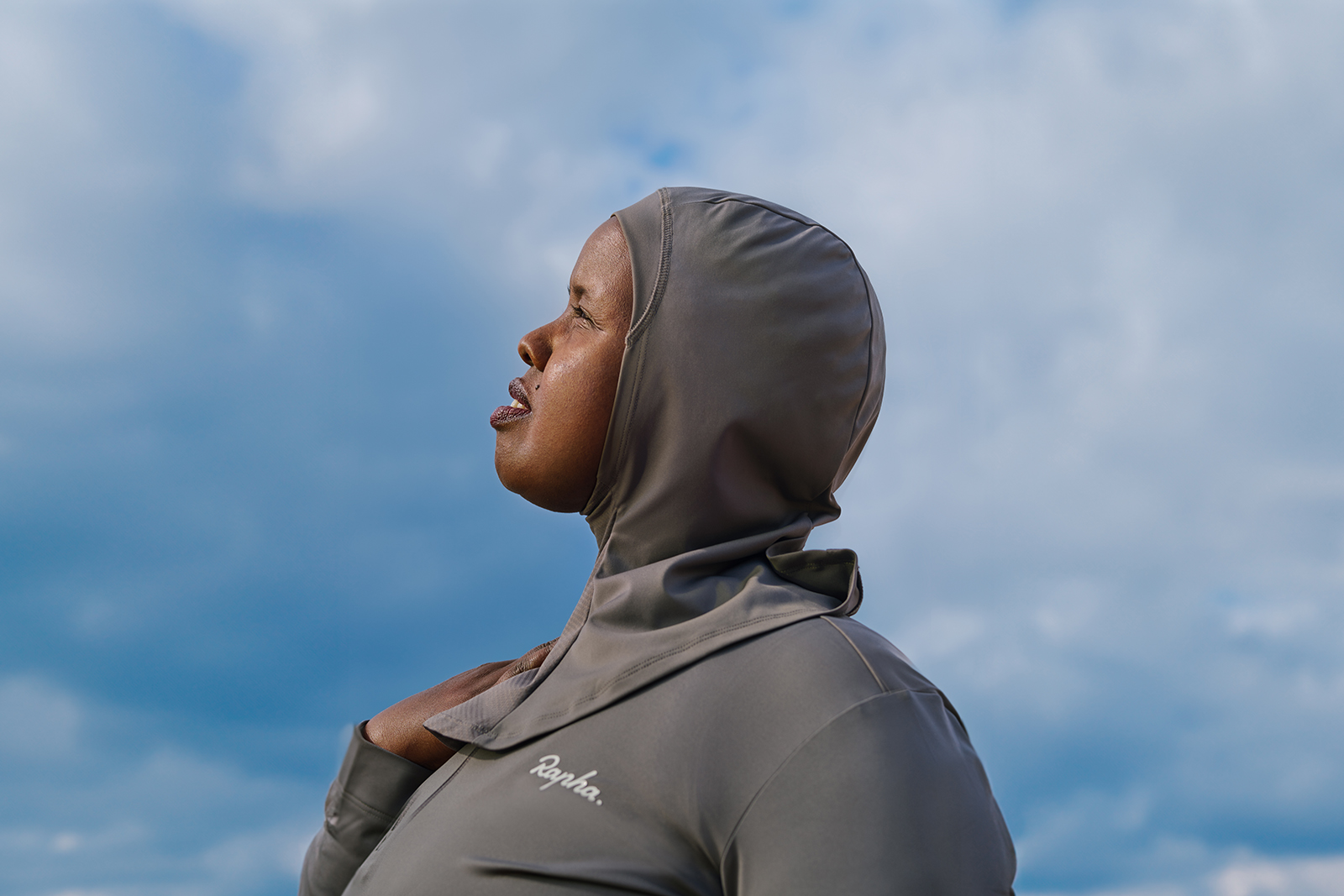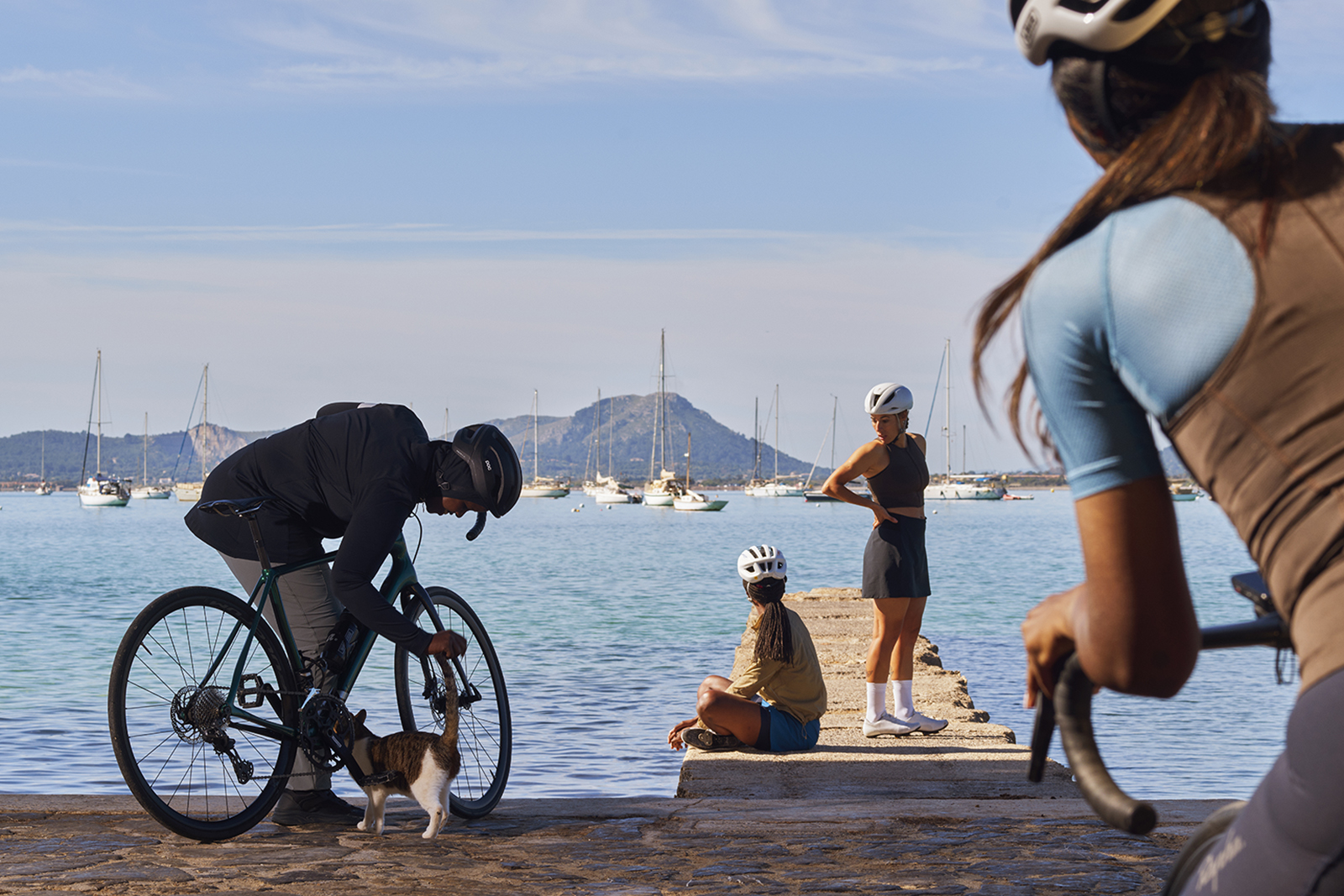A summer of sport promises more options for modest wear
A cycling group led by Muslim women has partnered with Rapha on a range of new clothing to make the sport more accessible
–

Faced with a sport known for skintight Lycra, women who choose to practise modesty have until now had to sacrifice comfort and functionality while riding a bike.
For Muslim women such as myself, who avoid exercise not because of concerns around social mores but rather from sheer laziness and a pathological hatred of physical activity, this isn’t a pressing issue. But avid cyclist Zainab Arian from Cycle Sisters, who recently completed the RideLondon 46-mile route, would have to layer bib shorts, jogging bottoms, a long T-shirt (usually from the men’s section) and a cycling jersey to participate in her favourite pastime. To the untrained eye, a running top and a cycling jersey might look much the same, but for anyone who spends any serious time on a bike there is a world of difference.
Over the past four years, Arian and other members of the award-winning cycling club have been helping the heritage cycling brand Rapha to design three new items of clothing — a cycling hijab, a long jersey and a pair of padded cycling trousers — that are intended to make cycling more accessible for Muslim women. “I think they were quite taken aback by how we had to compromise what we were wearing to go cycling,” Arian says.
“There’s a huge market for modest running tops, but nothing with the accessibility of having pockets at the back of the jersey where you can put your cycling apparel,” Arian explains, before mentioning other challenges faced during the design process. “The cut of the jersey can’t be too restrictive around your hips, because obviously you’re sitting and you need that motion. The neck of the jersey needs to have ventilation, but you don’t want it to open and be exposed. It’s those small things.”
A number of big brands have released modest sportswear aimed at Muslim women in the past few years, with Nike’s groundbreaking Pro Hijab launching in 2017 to widespread acclaim from female Muslim athletes such as Ibtihaj Muhammad, the first hijab-wearing Muslim American woman to win an Olympic medal. Other brands including Adidas, Under Armour and Gymshark, as well as smaller Muslim-owned brands like Imaan Active and Haya, have since added their own offerings to the rapidly growing market.
Muslim women often feel excluded from exercise and fitness spaces owing to interweaving factors: a desire to practise modesty in spaces where revealing clothing is often the norm, lack of suitable clothing options, lack of access and representation, and fear of possible discrimination. Fewer than one in five Muslim women exercise at least once a week — lower than any other faith group — according to Sports England participation figures from 2015.

Although there has been progress in breaking down the barriers for Muslim women in sport, it has been slow. Growing up, it wasn’t unusual for many of my hijabi friends to have never learned how to ride a bike in the first place, often a result of conservative parents discouraging their daughters from taking part in an activity they saw as better suited to boys. A 2023 report published by Muslimah Sports Association, England’s largest Muslim women’s sports charity, found that although 97% of British Muslim women surveyed wanted to increase their participation in sports, 37% were not involved in any.
Outside of Cycle Sisters, Arian works for the NHS, and has seen first-hand the discrepancy in uptake of physical exercise among patients. “You always find that Black, Asian and ethnic minorities have low uptake in physical exercise and physical activities, and therefore have a higher prevalence of long-term conditions. This is very stereotypical, but within South Asian households girls don’t do sports. I’m in my 40s. You don’t see many of us playing football or basketball or tennis because, growing up, I didn’t see my mum do it. We’re breaking that barrier,” she adds.
While modest sportswear is made with Muslim women in mind, many modest garments are suitable for any women who want a looser, more covered alternative to the usual skintight sportswear silhouette. Something particularly welcome for Arian and her fellow cyclists was that Rapha introduced the modest pieces as part of an overall relaunch of their women’s line, rather than as a tokenistic collection aimed specifically at Muslim women.
“It made it that much more inclusive,” she says. “The cycling hijab is very much for people who cover and observe hijab, but the modest jersey you could wear with either the bib shorts, or they’ve got a cycling skirt with a pad. It complements their other products. We don’t want to stand out by being different, we just want something that’s practical and meets our needs. The way that Rapha has done it, we fit in with their women’s range rather than sitting outside of it.”
In addition to their work with Rapha, Cycle Sisters also recently partnered with LYRA Modest, an activewear brand that specialises in modest swimwear, to provide women-only swimming lessons and open-water sessions across London. The initiative hopes to encourage more Muslim women to participate in triathlons, and promote equality and inclusion in swimming.
As the nation gears up for a summer of sport that includes the Euros, the Olympics and the Tour de France, the continuing rise of modest sportswear alongside an increase in Muslim female athletes — and further conversations around accessibility — points to a future in which Muslim women in sport will no longer be a minority within a minority.
Topics
Get the Hyphen weekly
Subscribe to Hyphen’s weekly round-up for insightful reportage, commentary and the latest arts and lifestyle coverage, from across the UK and Europe
